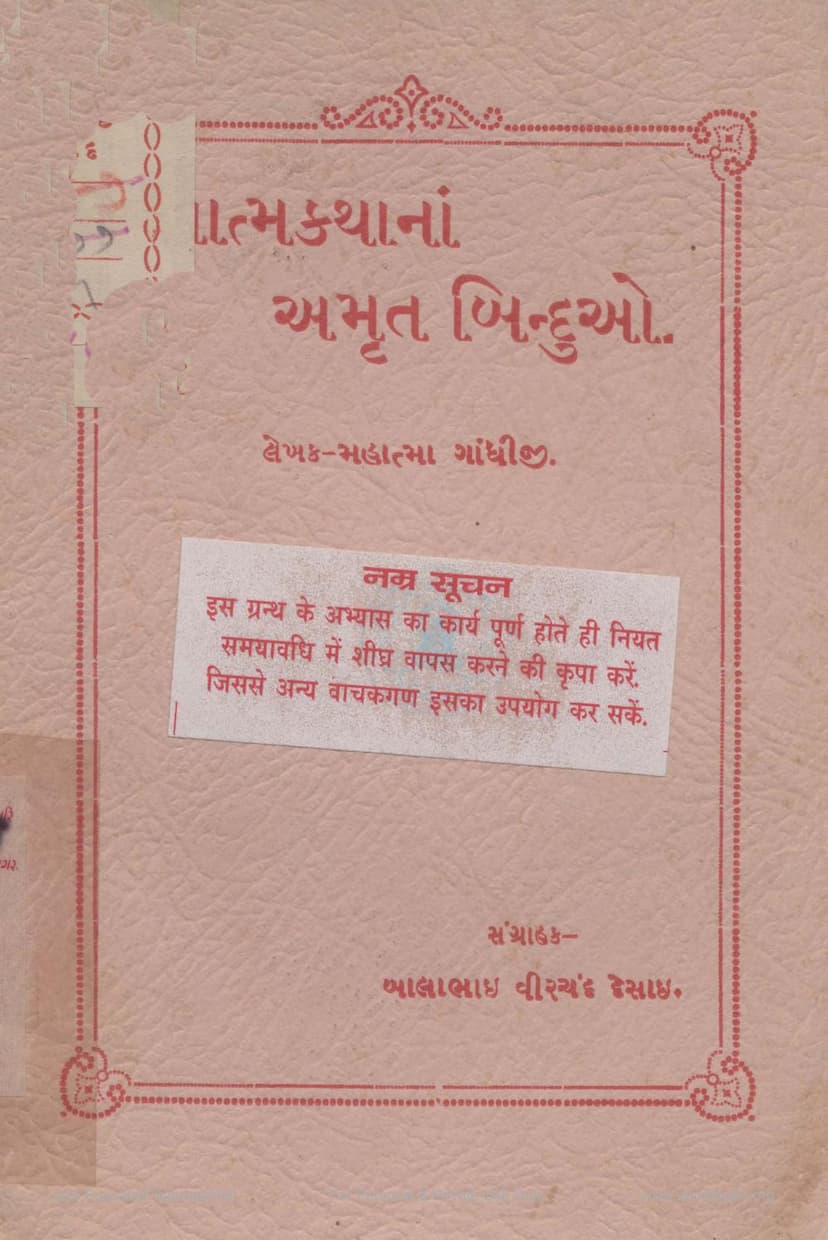Aatmakathana Amrut Binduo
Added to library: September 1, 2025

Summary
This document is a collection of Gujarati quotes and excerpts from Mahatma Gandhi's autobiography, titled "Aatmakathana Amrut Binduo" (Nectar Drops from My Autobiography). Compiled by Balabhai Virchand Desai, it presents Gandhi's profound thoughts on various aspects of life, spirituality, ethics, and social conduct.
The book is a compilation of what the compiler, Balabhai Virchand Desai, considered to be the most impactful and insightful passages from Gandhi's autobiography. He explains that while he had read the autobiography before, a later re-reading brought him to a deeper appreciation of its "ocean of beautiful and true thoughts." He found certain chapters, paragraphs, and lines to have a profound effect on him, seeing them as divine pronouncements. This led him to meticulously collect these "nectar drops."
The collection covers a wide range of topics, including:
- Truth and Self-Discipline: Gandhi emphasizes the paramount importance of truth, even in business, and the need for self-control and adherence to vows. He expresses his belief that true peace comes from controlling the mind and senses.
- Spiritual and Ethical Living: The book highlights Gandhi's views on the nature of prayer and worship, not as mere rituals but as expressions of the heart's purity. He stresses the need for humility, self-reflection, and the constant pursuit of self-knowledge and God-realization.
- Social and Political Ideas: Gandhi's thoughts on the role of public institutions, financial accountability, and the importance of avoiding debt in public work are shared. He also touches upon his views on women's roles, marriage, and education.
- Personal Conduct and Character: The collection delves into Gandhi's insights on friendship, the nature of criticism, the importance of balanced living, and the value of physical and mental discipline. He advocates for simplicity in diet and lifestyle, believing it aids in self-control.
- The Path of Non-Violence (Ahimsa) and Satyagraha: Several excerpts focus on the philosophy of Ahimsa, defining it not just as absence of physical violence but as a positive force of love and compassion for all living beings. He discusses Satyagraha as the ultimate non-violent weapon and the importance of inner discipline and steadfastness in its practice.
- The Role of the Teacher and Education: Gandhi emphasizes the profound influence of a teacher's conduct on students, stating that a teacher's life is a lesson in itself. He believes that true learning comes from direct experience and that a teacher must be an embodiment of the values they wish to impart.
- The Nature of Reality and God: Gandhi expresses his belief that truth is God and that the path to realizing God lies in living a life of truth and non-violence. He acknowledges the immense difficulty in achieving this, the constant struggle against inner vices, and the need for continuous effort and purification.
The compiler's preface expresses deep respect for Gandhi, acknowledging him as a true human being even if others hesitate to call him a "Mahatma" or a political leader. He encourages readers to approach the text with an open heart and a thoughtful mind, viewing each sentence as a guiding principle. The hope is that this compilation will benefit readers as much as it has benefited the compiler, revealing the invaluable treasure contained within this small booklet.